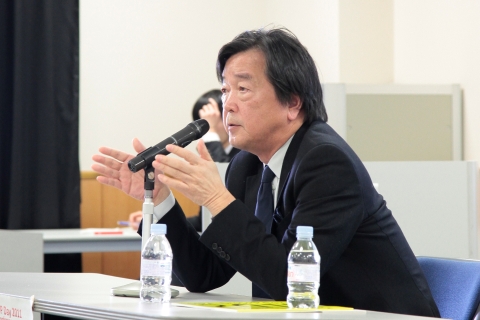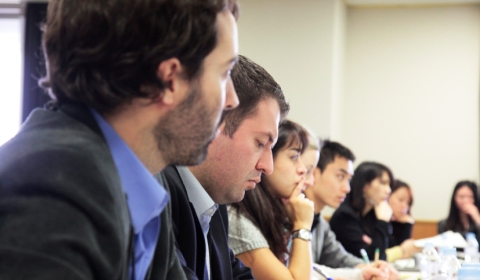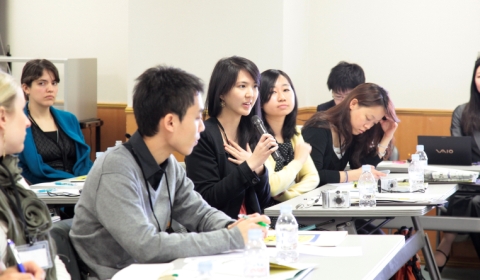SIPA-GraSPP Day 2011
Keynote lecture by Professor Hitoshi Tanaka
“Crisis Management”
First of all, I would like to thank everyone here for coming under crisis. I hope you are all safe. I never expect talk about crisis management. I was supposed to talk about East Asia integration. Let me talk about the current situation and political legal implication regarding this earthquake. We all know that huge, unprecedented earthquake which was magnitude 9.0 hit Japan. It caused a tsunami beyond everyone's imagination. The television had forecasted 7 meters high tsunami but it was actually much higher than 10m, which is unprecedented. It reached 5km from the coast. Almost all the towns there were wiped out. Death toll now is 1500 people. More than 10000 people are unaccounted for and most of them might have been killed. 2400 are still waiting for rescue. You must have heard about the explosion of nuclear power plant. Their cooling system was disabled. Yet radiation contamination has not taken place. Japanese technology of nuclear plant is excellent. The scale of earthquake and tsunami are beyond our assumption.

I recall another comparable earthquake, which hit Kobe in 1995. The government learnt from that earthquake. As you know, the DPJ is an inexperienced government. The DPJ Prime Minister Kan is doing well, considering the DPJ is managing this type of crisis for the first time. I had expected that they would have been clumsy. There are several things which can be told about managing this earthquake and tsunami. First, in the case of the earthquake in Kobe, the governor of Osaka hesitated in calling in the self defense force. This was a major mistake.
In the case of Kobe, the worst issue was fire. The second mistake in the case of Kobe is control of roads. They did not make any restriction of roads passages. So, anxious people jammed the roads. On the other hand, this time, the governor in Miyagi instantly asked for the deployment of the self defense force. 50000 SDF are already called into operation. For this type of crisis, most effective mean is SDF. They have self-sufficient military ways of operation. This is the lesson from the case of Kobe.
Secondly, government decided to block roads that helped the rescue operators to reach the crisis area. The government appears on television frequently. But in case of Kobe, Murayama, the prime minister at that time didn't. These actions have taken place at a really early place. The Cabinet has frequently meetings regarding the nuclear plant.
The important thing for this crisis is you have to be as transparent as much as possible. For example, the nuclear plant issue affects all of us. I was in the government for a long time. There is a tendency that we would not reveal everything so as not to cause panic. Many people seem to try to get information. However, revealing information without the full context can causes panic. One might reach the wrong conclusion. The Tokyo Electric Co. lost 20% of its power supply capabilities and they decided for planned black-outs in damaged areas. You cannot avoid confusion this time about crisis management.
There are two further important issues; one is how to carry out rescue operations for 10000 unaccounted for people. Let me talk about various concerns. Regarding economic concerns, stock market experienced a huge drop. All Japanese automobiles companies stopped production. Power companies stock must have decreased. Second, it require huge amount of money for the reconstruction of the region affected by this crisis. Interestingly, Japan is suffering from a budget deficit. New year's budget has been debated in the Diet.
This is probably an unintended case. People are talking about the need for tax increases. Before the crisis, the DPJ hesitated about consumption tax increase. Now clearly, all of Japan agreed on the budget for reconstruction. This is the chance to raise consumption tax.

Regarding nuclear plant, huge debate will occur about plant construction. Japan is at the most advanced stage for nuclear technology. I think it depends on the result of the current situation. If they fail to manage the current nuclear crisis, there would be opposition about expanding plants. There is already a huge and strong movement to protect environment. We cannot avoid debate for the future nuclear plants. There is political concern of this current crisis. I was watching television. They showed money scandal about Prime Minister Kan who received money from a foreigner, which was forbidden. Maehara resigned for the same scandal.
It is difficult to recognize who are donating to Japanese politician and where they are from. The same thing that occurred for Maehara happened to Kan. However, on that day, the earthquake hit Japan. There would have been more debate about the scandal. But no one is talking about it now. Japan is going to concentrate on earthquake. The DPJ's Kan will be most likely to survive for at least another 2 or 3 months. Another concern is the Japanese media showing President Obama's statement of rescue, of US support operations in damaged area. Not just US, there are enormous help from all over the world. Korea, China, Russia….etc. Before the crisis, Japan and U.S. relation was getting bad. One US official made improper statement about the people in Okinawa being lazy, which caused a lot of controversy in Japan. But that news is gone now. This crisis might lead to the stabilization of the DPJ government and the relation between Japan and U.S. Japan has to face enormous difficulties from now. But recovery of confidence would be the unique case for Japan. Therefore, your experience in Japan should be precious. You can learn something from what is going on in Japan.


